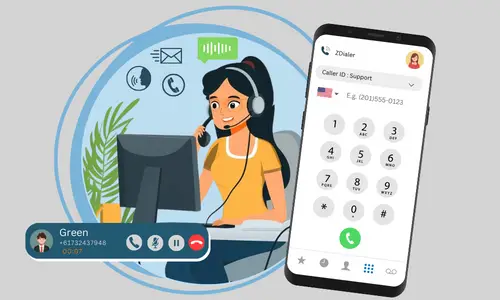PSTN Termination: Revolutionizing Telecommunications
Seamless Connectivity, Unmatched Reliability Experience the Future of PSTN Termination Today!
PSTN Termination: Bridging the Gap between VoIP and Traditional Telephony. Connect effortlessly across digital and conventional phone networks with our seamless PSTN Termination service.


Understanding PSTN Termination
PSTN Termination is a telecommunications service that facilitates the connection of Voice over Internet Protocol (VoIP) calls to the traditional Public Switched Telephone Network (PSTN). This service enables seamless transition and completion of digital calls to conventional phone lines, thereby integrating modern VoIP Termination with established telephone networks.
Benefits For The PSTN Termination
Configuring
Ensure your VoIP equipment is compatible with PSTN, or use a VoIP gateway for conversion. Properly configure your system to route calls through the PSTN network.
Cost Management
Monitor your PSTN costs carefully to prevent unexpected bills. If your call volume is high, explore volume-based pricing plans as an option.
Back-Up Solution
Have a backup plan in case of PSTN network outages. Consider redundancy options to ensure continuous connectivity.
Quality Assurance
Regularly test the quality of your termination service to ensure optimal call clarity. Address any issues promptly to maintain customer satisfaction.
How PSTN Termination Operates

Call Initiation: The process begins with a call being initiated from a digital source.
Routing to Provider: The call is then routed to a provider for further processing.
Connection: The provider connects the call to the traditional PSTN network.
Routing: Within the PSTN, the call is routed to the recipient's phone.
Conversation: Once answered, a conversation takes place between the caller and recipient via the PSTN network.

Selecting a Provider for PSTN Termination Services

Service Stability

Technical Support

Infrastructure
Support

Interconnectivity
Cloud-Based Termination of PSTN

Geographic Reach: Cloud-based termination services often offer global coverage, allowing businesses to connect with customers and partners around the world via the PSTN.
Quick Deployment: Cloud-based PSTN setup is faster than on-premises hardware, allowing swift voice communication expansion.
Advanced Analytics: Cloud-based PSTN offers analytics for call performance, usage patterns, and quality insights, empowering informed decisions and enhancements.
Automated Maintenance: Cloud-based PSTN offers analytics for call performance, usage patterns, and quality insights, empowering informed decisions and enhancements.
Cloud Infrastructure A cloud-based service for terminating calls is hosted in data centers across the cloud. These data centers have extensive connectivity and redundancy to ensure reliable voice communication.
Progressing Voice Communication: IP Telephony, Termination Services, and Unified Communication
Progressive Voice Communication, combining IP Telephony, Termination Services, and Unified Communication, revolutionizes business. IP Telephony offers efficient voice, Termination Services connect to traditional networks, and Unified Communication fosters seamless collaboration. This empowers organizations with enhanced communication and global connectivity, a cornerstone of modern business strategies.
My Country Mobile's Trusted Partnerships









My Country Mobile Reviews

4.6 out of 5

4.8 out of 5

4.7 out of 5

4.9 out of 5
Gain an edge with our PSTN Termination solutions, ensuring seamless communication and reliable connectivity for your business needs.
Secure reliable PSTN Termination services and enhance communication networks for seamless business operations.
FAQs For PSTN Termination
Why do businesses use PSTN termination?
Businesses use this service to reach customers who still use traditional phone lines, ensuring broader communication reach and compatibility.
What equipment is needed ?
To utilize this service, you typically need a VoIP gateway or an IP-PSTN gateway device that can convert digital voice signals into analog signals for connection to the public switched telephone network (PSTN).
Is PSTN termination the same as VoIP?
No, PSTN termination involves connecting VoIP networks to the traditional PSTN, while VoIP is an entirely internet-based technology for voice communication.
What is the cost associated with terminating calls over traditional phone lines?
The cost varies depending on factors like call volume, destination countries, and service providers. You may be charged per minute, per channel, or based on other usage metrics
Are there quality differences between PSTN termination and VoIP calls?
Calls made over the traditional PSTN network typically have consistent and high-quality voice transmission, while VoIP calls can vary in quality depending on factors like internet connection and network congestion.
Is PSTN termination still relevant in the age of VoIP and mobile phones?
Yes, PSTN termination remains relevant, especially for businesses that need to reach customers who rely on landlines or areas with limited internet connectivity.
Can I use my existing VoIP system for PSTN termination?
Yes, you can use your existing VoIP system for PSTN termination with the appropriate equipment or service provider support.
Is PSTN termination secure?
PSTN termination is generally considered secure because it uses dedicated lines and is less susceptible to internet-based security threats.
How can I choose a PSTN termination provider?
Factors to consider when choosing a provider include pricing, call quality, coverage, customer support, and any additional features or services offered.
Can I integrate PSTN termination with my existing VoIP infrastructure?
Yes, PSTN termination can be seamlessly integrated with your existing VoIP infrastructure, enhancing your communication capabilities.


















